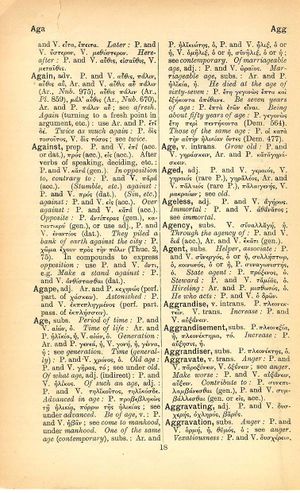age
Τὸ γὰρ θανεῖν οὐκ αἰσχρόν, ἀλλ' αἰσχρῶς θανεῖν → Mors ipsa non est foeda, sed foede mori → Das Sterben bringt nicht Schmach, doch sterben in der Schmach
English > Greek (Woodhouse)
subs.
Period of time: P. and V. αἰών, ὁ.
Time of life: Ar. and P. ἡλικία, ἡ, V. αἰών, ὁ.
Generation: Ar. and P. γενεά, ἡ, V. γονή, ἡ, γέννα, ἡ; see generation.
Time (generally): P. and V. χρόνος, ὁ.
Old age: P. and V. γῆρας, τό; see under old.
Of what age, adj. (indirect): P. and V. ἡλίκος.
Of such an age, adj.: P. and V. τηλικοῦτος, τηλικόσδε.
Advanced in age: P. προβεβληκὼς τῇ ἡλικίᾳ, πόρρω τῆς ἡλικίας; see under advanced.
Be of age, v.: P. and V. ἡβᾶν; see come to manhood, under manhood.
One of the same age (contemporary), subs.: Ar. and P. ἡλικιώτης, ὁ, P. and V. ἧλιξ, ὁ or ἡ, V. ὁμῆλιξ, ὁ or ἡ, συνῆλιξ, ὁ or ἡ; see contemporary.
Of marriageable age, adj.: P. and V. ὡραῖος.
Marriageable age, subs.: Ar. and P. ἡλικία, ἡ.
He died at the age of sixty-seven: P. ἔτη γεγονὼς ἕπτα καὶ ἐξήκοντα ἀπέθανε.
Be seven years of age: P. ἑπτὰ ἐτῶν εἶναι.
Being about fifty years of age: P. γεγονὼς ἔτη περὶ πεντήκοντα (Dem. 564).
Those of the same age: P. οἱ κατὰ τὴν αὐτὴν ἡλικίαν ὄντες (Dem. 477).
v. intrans.
Grow old: P. and V. γηράσκειν, Ar. and P. καταγηράσκειν.

